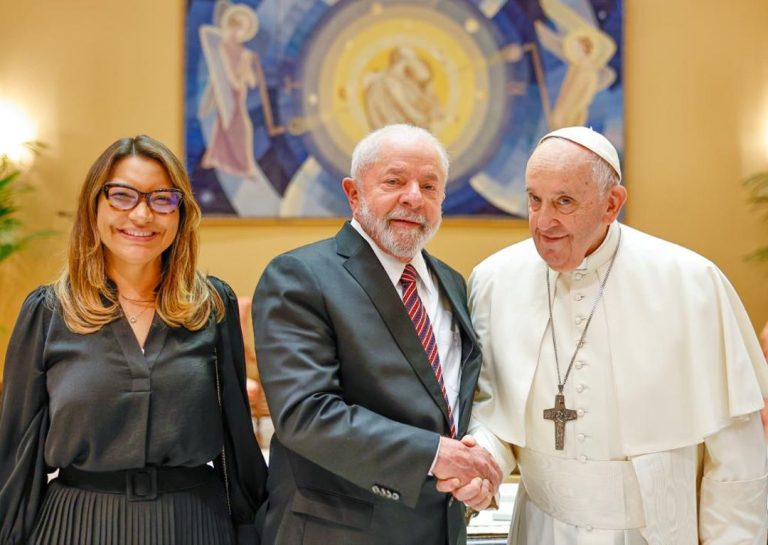23 de junio 2023

“NicaraguAmor” Cultural Caravan for Nicaraguans in the USA

PUBLICIDAD 1M
PUBLICIDAD 4D
PUBLICIDAD 5D
After meeting with Pope Francis, Brazil’s president affirms that imprisoning the religious leader was a “mistake” of his Nicaraguan colleague

Brazilian President Luiz Inácio Lula da Silva (center) greets Pope Francis in the presence of Brazilian First Lady Rosangela da Silva. Photo: EFE
After meeting in Rome with Pope Francis, Brazilian President Lula da Silva assured on June 22 that, he will attempt to convince his Nicaraguan counterpart, Daniel Ortega, to free Bishop Rolando Alvarez. The political prisoner was sentenced to 26 years and four months in prison, after he refused to abandon the country for exile in the United States.
In a press conference held at the close of his visit to Rome and the Vatican, Lula explained that the only thing the Catholic Church in Nicaragua desires is for Bishop Alvarez to be freed, so he can travel to Italy. Lula considered that imprisoning Alvarez has been “a mistake” on the part of Ortega.
“I’ll speak with Ortega so they can give [Bishop Alvarez] his freedom, because you need to learn to ask for pardon (…) and to recognize this error,” stated Lula. The Brazilian leader conversed with Pope Francis at the Vatican for 45 minutes on Wednesday, June 21.
Lula asserted that convincing Ortega would be “a labor of patience,” but that he has a lot of that and will try to obtain it.
On February 9, 2023, the Ortega government released and expelled 222 political prisoners from the country, who were transferred to Washington on a plane chartered by the US government. However, two of the prisoners refused to leave the country, one of them Monsignor Rolando Alvarez, bishop of Matagalpa and Esteli, who had been locked up for sermons unflattering to the government. As a consequence of his refusal to leave, the religious leader was stripped of his citizenship and transferred from his house arrest to a maximum-security cell in the Jorge Navarro National Penitentiary System, better known as “La Modelo”.
In addition to this assault on the Catholic Church, Ortega has suspended bilateral relations with the Vatican, expelled Apostolic Nuncio Waldemar Stanislaw Sommertag, and severed diplomatic relations with the Holy See. The Nicaraguan strongman cancelled the appointment of Elliette Ortega Sotomayor as ambassador to the Holy See on September 21, 2021.
The Nicaraguan president has publicly described the Church as a “mafia,” and accused it of being undemocratic for not allowing Catholics to elect the pope, cardinals, bishops and priests by direct vote.
In the last few days, Brazil has proposed modifying and softening a draft resolution of the Organization of American States condemning the Ortega government’s repression. The Brazilian posture has been rejected and criticized by over 50 Nicaraguans who the dictatorship has declared “stateless” and stripped of their nationality.
The resolution that Brazil wants to amend was presented by Canada, Chile, Costa Rica, the United States, Antigua and Barbuda under the title: “The human rights crisis in Nicaragua.” It must now be put to a vote during the 53rd General Assembly of the OAS, which opened in Washington on June 21.
On June 14, the government of Luiz Inacio Lula da Silva submitted a document of observations that proposed softening several references to the repression and the arbitrary detentions in Nicaragua.
Substantively, the Brazilian representative to the OAS asked to exchange the phrase “return to democracy” in Nicaragua for one that speaks of the “strengthening of democracy” in the Central American country.
Brazil also proposed eliminating those references that assume as fact that the Ortega government has repressed the population and committed arbitrary detentions. Instead, they propose urging Managua to “abstain from repression and arbitrary detention.”
This article was originally published in Spanish in Confidencial and translated by Havana Times.
PUBLICIDAD 3M
Confidencial es un diario digital nicaragüense, de formato multimedia, fundado por Carlos F. Chamorro en junio de 1996. Inició como un semanario impreso y hoy es un medio de referencia regional con información, análisis, entrevistas, perfiles, reportajes e investigaciones sobre Nicaragua, informando desde el exilio por la persecución política de la dictadura de Daniel Ortega y Rosario Murillo.
PUBLICIDAD 3D